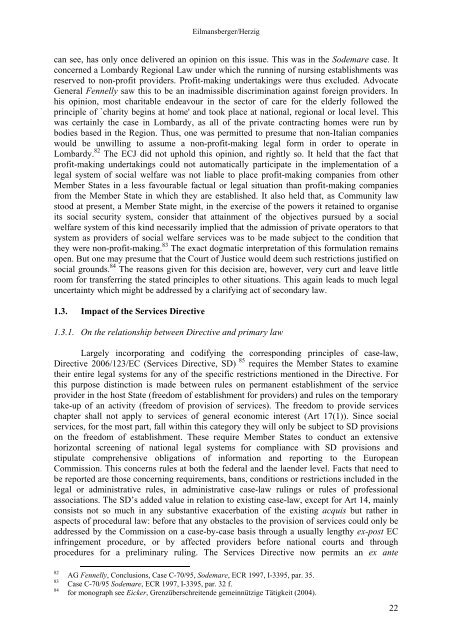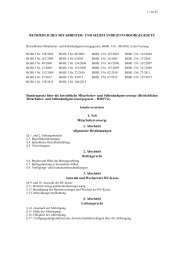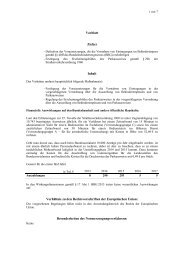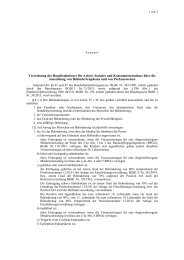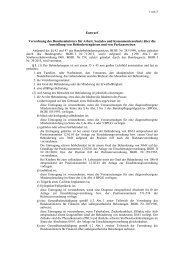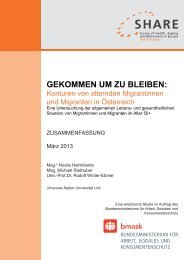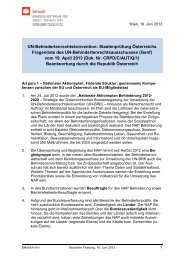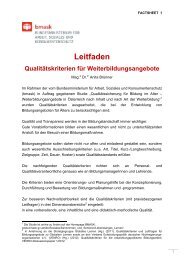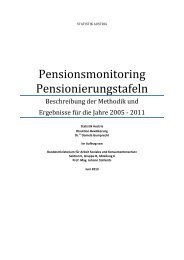Social Services of General Interest (SSGI)
Social Services of General Interest (SSGI)
Social Services of General Interest (SSGI)
Create successful ePaper yourself
Turn your PDF publications into a flip-book with our unique Google optimized e-Paper software.
Eilmansberger/Herzig<br />
can see, has only once delivered an opinion on this issue. This was in the Sodemare case. It<br />
concerned a Lombardy Regional Law under which the running <strong>of</strong> nursing establishments was<br />
reserved to non-pr<strong>of</strong>it providers. Pr<strong>of</strong>it-making undertakings were thus excluded. Advocate<br />
<strong>General</strong> Fennelly saw this to be an inadmissible discrimination against foreign providers. In<br />
his opinion, most charitable endeavour in the sector <strong>of</strong> care for the elderly followed the<br />
principle <strong>of</strong> `charity begins at home' and took place at national, regional or local level. This<br />
was certainly the case in Lombardy, as all <strong>of</strong> the private contracting homes were run by<br />
bodies based in the Region. Thus, one was permitted to presume that non-Italian companies<br />
would be unwilling to assume a non-pr<strong>of</strong>it-making legal form in order to operate in<br />
Lombardy. 82 The ECJ did not uphold this opinion, and rightly so. It held that the fact that<br />
pr<strong>of</strong>it-making undertakings could not automatically participate in the implementation <strong>of</strong> a<br />
legal system <strong>of</strong> social welfare was not liable to place pr<strong>of</strong>it-making companies from other<br />
Member States in a less favourable factual or legal situation than pr<strong>of</strong>it-making companies<br />
from the Member State in which they are established. It also held that, as Community law<br />
stood at present, a Member State might, in the exercise <strong>of</strong> the powers it retained to organise<br />
its social security system, consider that attainment <strong>of</strong> the objectives pursued by a social<br />
welfare system <strong>of</strong> this kind necessarily implied that the admission <strong>of</strong> private operators to that<br />
system as providers <strong>of</strong> social welfare services was to be made subject to the condition that<br />
they were non-pr<strong>of</strong>it-making. 83 The exact dogmatic interpretation <strong>of</strong> this formulation remains<br />
open. But one may presume that the Court <strong>of</strong> Justice would deem such restrictions justified on<br />
social grounds. 84 The reasons given for this decision are, however, very curt and leave little<br />
room for transferring the stated principles to other situations. This again leads to much legal<br />
uncertainty which might be addressed by a clarifying act <strong>of</strong> secondary law.<br />
1.3. Impact <strong>of</strong> the <strong>Services</strong> Directive<br />
1.3.1. On the relationship between Directive and primary law<br />
Largely incorporating and codifying the corresponding principles <strong>of</strong> case-law,<br />
Directive 2006/123/EC (<strong>Services</strong> Directive, SD) 85 requires the Member States to examine<br />
their entire legal systems for any <strong>of</strong> the specific restrictions mentioned in the Directive. For<br />
this purpose distinction is made between rules on permanent establishment <strong>of</strong> the service<br />
provider in the host State (freedom <strong>of</strong> establishment for providers) and rules on the temporary<br />
take-up <strong>of</strong> an activity (freedom <strong>of</strong> provision <strong>of</strong> services). The freedom to provide services<br />
chapter shall not apply to services <strong>of</strong> general economic interest (Art 17(1)). Since social<br />
services, for the most part, fall within this category they will only be subject to SD provisions<br />
on the freedom <strong>of</strong> establishment. These require Member States to conduct an extensive<br />
horizontal screening <strong>of</strong> national legal systems for compliance with SD provisions and<br />
stipulate comprehensive obligations <strong>of</strong> information and reporting to the European<br />
Commission. This concerns rules at both the federal and the laender level. Facts that need to<br />
be reported are those concerning requirements, bans, conditions or restrictions included in the<br />
legal or administrative rules, in administrative case-law rulings or rules <strong>of</strong> pr<strong>of</strong>essional<br />
associations. The SD’s added value in relation to existing case-law, except for Art 14, mainly<br />
consists not so much in any substantive exacerbation <strong>of</strong> the existing acquis but rather in<br />
aspects <strong>of</strong> procedural law: before that any obstacles to the provision <strong>of</strong> services could only be<br />
addressed by the Commission on a case-by-case basis through a usually lengthy ex-post EC<br />
infringement procedure, or by affected providers before national courts and through<br />
procedures for a preliminary ruling. The <strong>Services</strong> Directive now permits an ex ante<br />
82 AG Fennelly, Conclusions, Case C-70/95, Sodemare, ECR 1997, I-3395, par. 35.<br />
83 Case C-70/95 Sodemare, ECR 1997, I-3395, par. 32 f.<br />
84 for monograph see Eicker, Grenzüberschreitende gemeinnützige Tätigkeit (2004).<br />
22


